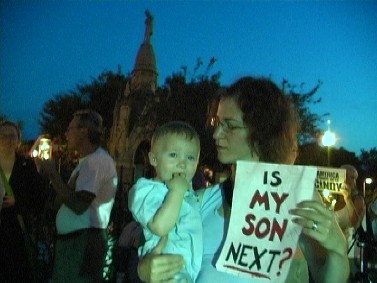June 28, 2005
Downing Street Memo: Part 1
This is a free service.
However, financial support is vital.
Please consider giving less to the corporate media and
donating more to Media Lens.
At the Nuremberg war crimes tribunal in 1946, Nazi leaders like Goering, von Ribbentrop, Jodl and Streicher were sentenced to death by hanging for "Crimes against Peace: namely, planning, preparation, initiation or waging of a war of aggression, or a war in violation of international treaties, agreements or assurances, or participation in a Common Plan or Conspiracy for the accomplishment of any of the foregoing." (Article 6, Charter of the International Military Tribunal, August 8, 1945.
LinkIt is remarkable, but now indisputable, that the current leaders of Britain and the United States are responsible for just such a conspiracy.
Carne Ross, a key Foreign Office diplomat responsible for liaising with UN inspectors in Iraq, said last week that British government claims about Iraq's weapons programme had been "totally implausible".
Ross told the Guardian: "I'd read the intelligence on WMD for four and a half years, and there's no way that it could sustain the case that the government was presenting. All of my colleagues knew that, too. There was a very good alternative to war that was never properly pursued, which was to close down Saddam's sources of illegal revenue." (Richard Norton-Taylor, 'WMD claims were "totally implausible",' The Guardian, June 20, 2005)
But an alternative to war was never an option for the Bush-Blair alliance. On May 1, the Sunday Times published a leaked Downing Street memo that hammered the final nails in the coffin of Tony Blair's credibility. The document - minutes of a highly confidential meeting dated July 23, 2002 - was written eight months before the invasion began.
John Scarlett, chairman of the joint intelligence committee (JIC), opened proceedings by summarising the intelligence and latest JIC assessment:
"Saddam's regime was tough and based on extreme fear. The only way to overthrow it was likely to be by massive military action." (Michael Smith, 'Blair planned Iraq war from start,' Sunday Times, May 1, 2005)
As Scarlett's initial statement makes clear, it was understood by everyone present that the issue at hand was how best to overthrow Saddam Hussein, not how to neutralise the supposed threat from any weapons of mass destruction. Indeed little mention was made of WMD.
The memo then records the words of Sir Richard Dearlove, the head of the British intelligence service MI6, who commented on his recent visit to Washington where he had held talks with George Tenet, director of the CIA: "There was a perceptible shift in attitude. Military action was now seen as inevitable. Bush wanted to remove Saddam, through military action, justified by the conjunction of terrorism and WMD.
But the intelligence and facts were being fixed around the policy. The NSC [US National Security Council] had no patience with the UN route, and no enthusiasm for publishing material on the Iraqi regime's record. There was little discussion in Washington of the aftermath after military action." (ibid)
This recognition of the inevitability of war is reiterated in comments made in the meeting by foreign secretary Jack Straw: "It seemed clear that Bush had made up his mind to take military action, even if the timing was not yet decided. But the case was thin. Saddam was not threatening his neighbours, and his WMD capability was less than that of Libya, North Korea or Iran." (ibid)
But in the absence of a threat - even to Iraq's neighbours, much less to the West - how could war possibly be justified? Straw explained: "We should work up a plan for an ultimatum to Saddam to allow back in the UN weapons inspectors. This would also help with the legal justification for the use of force." (ibid)
A further leaked Cabinet Office briefing paper from the same day clarifies that since regime change was illegal under international law it was "necessary to create the conditions" that would help provide legitimacy for war.
Writing in the Sunday Times, Michael Smith notes that the briefing paper asserts the only way the allies could justify military action was "to place Saddam Hussein in a position where he ignored or rejected a United Nations ultimatum ordering him to co-operate with the weapons inspectors". But the briefing paper warns this would be difficult.
"It is just possible that an ultimatum could be cast in terms which Saddam would reject," the document says. But if he accepted it and did not attack the allies, they would be "most unlikely" to obtain the legal justification they needed. (Smith, 'Ministers were told of need for Gulf war "excuse",' Sunday Times, June 12, 2005)
Notice the point is not that it was "just possible" than an ultimatum could be cast in terms which Saddam would +accept+ - an outcome that might have allowed a peaceful resolution to the crisis. The aspiration was to cast an ultimatum that Saddam would +reject+, so providing an excuse for war. The goal, clearly, was to lay a trap for a war of aggression and conquest, not to negotiate for peace and security through disarmament.
After all, if disarmament had been the concern, an ultimatum would have been superfluous - Saddam was "not threatening his neighbours, and his WMD capability was less than that of Libya, North Korea or Iran".
Smith accurately comments: "The suggestions that the allies use the UN to justify war contradicts claims by Blair and Bush, repeated during their Washington summit last week, that they turned to the UN in order to avoid having to go to war." (ibid)
But this was merely Plan A of a two-part plan to make war possible.
There was also Plan B. As part of the "attempt to provoke Saddam Hussein into giving the allies an excuse for war," Smith writes, Britain and America increased bombing raids on Iraq, dropping twice as many bombs in the second half of 2002 as they did during the whole of 2001. (Smith, 'RAF bombing raids tried to goad Saddam into war,' Sunday Times, May 29, 2005) By October, with the UN vote still two weeks away, RAF aircraft were dropping 64% of bombs falling on the southern no-fly zone.
This aggressive targeting of Iraqi defences contradicted Foreign Office legal advice appended to the leaked July 23, 2002 briefing paper, which states that allied aircraft were only "entitled to use force in self-defence where such a use of force is a necessary and proportionate response to actual or imminent attack from Iraqi ground systems". (ibid) The attacks, in other words, were illegal acts of state terror.
Last week, Smith summarised the two-part plan to generate an excuse for war in an article in the Los Angeles Times: "British officials hoped the ultimatum [for Iraq to readmit UN weapons inspectors] could be framed in words that would be so unacceptable to Hussein that he would reject it outright.
But they were far from certain this would work, so there was also a Plan B... Put simply, US aircraft patrolling the southern no-fly zone were dropping a lot more bombs in the hope of provoking a reaction that would give the allies an excuse to carry out a full-scale bombing campaign, an air war, the first stage of the conflict." (Michael Smith, 'The real news in the Downing Street memos,' Los Angeles Times, June 23, 2005; http://www.latimes.com/news/opinion/commentary/la-oe smith23jun23,0,1838831.story)
Straw, Blair And The Big LieThe staggering deceit and criminality of the current British leadership is apparent when we compare the above with their public statements. Despite clearly plotting to ensure a violent outcome at least as early as July 2002, Jack Straw told BBC Radio 4's Today programme in January 2003: "What's important for people to understand is that war is not inevitable." ('War with Iraq not inevitable - Straw,' January 6, 2003, 12:19 GMT; http://news.bbc.co.uk/1/hi/uk_politics/2630155.stm
Responding to comments made by an unnamed government source suggesting that the prospect of conflict had receded from a 60:40 likelihood of conflict to a 60:40 likelihood of peace, Straw commented: "I think that's a reasonably accurate description." (ibid)
This was Jonathan Freedland's take on Straw in the Guardian: "To dump Straw would look especially perverse after Sunday's leaked memo revealed not only that Downing Street had set its heart on regime change back in 2002 - as opponents of the war always charged - but also that Straw played a Colin Powell role in those internal deliberations, warning that the case against Iraq was 'thin'. To make him the fall guy would look unfair..." (Freedland, 'Campaign 05: It won't be the names that matter,' The Guardian, May 3, 2005)
In his May 1 article, Smith had rightly rejected exactly this benign interpretation:
"Despite voicing concerns, Straw was
not standing in the way of war. It was he who suggested a solution: they should force Saddam into a corner where he would give them a clear reason for war." (Smith, Sunday Times, May 1, op. cit, our emphasis)
That was obvious to Smith; it is obvious to us. How curious that it was not also obvious to Freedland. Straw was in fact proposing a conspiracy to lure Saddam into actions that would help 'legitimise' a US-UK war of aggression.
In the July 23, 2002 memo, the attorney general, Lord Goldsmith, warned that the desire for regime change was not a legal base for military action. Tony Blair responded that "it would make a big difference politically and legally if Saddam refused to allow in the UN inspectors".
Blair's comment was made in the context of Straw's points about the lack of a threat and the need for an ultimatum, and of the briefing paper arguing it was "just possible" that "an ultimatum could be cast in terms which Saddam would reject".
Blair, then, was also willing to use UN inspectors, not to disarm Iraq, but to provoke Saddam's refusal to cooperate, so providing an excuse for war.
Blair's criminality in launching a war of aggression, and in lying to Parliament and to the British people, is therefore not in doubt. On November 8, 2002, Blair said:
"Iraq now has a 'final opportunity' to comply with its international and legal obligations by giving up once and for all its weapons of mass destruction... If it does not, then the consequences are clear." (Cited, Panorama, Iraq - Tony & the Truth, BBC 1, 10.15PM, March 20, 2005; http://www.informationclearinghouse.info/article8579.htm)
The "final opportunity" was a fraud, an endgame in a plot to provide an excuse for war. The consequences, completely regardless of Saddam's response, were already clear.
In February 2003, Blair said: "If we go to war it will not be because we want to, but because we have to in order to disarm Saddam." (David Cracknell and Sarah Baxter, 'Allies set date for Iraq war,' Sunday Times, February 23, 2003)
As late as February 15, 2003 - just one month before the war began on March 20 - Blair told the Labour Party's spring conference in Glasgow: "I hope, even now, Iraq can be disarmed peacefully, with or without Saddam." ('Blair speech - key quotes,' February 15, 2003, 12:38 GMT; http://news.bbc.co.uk/1/hi/uk_politics/2765763.stm)
But Blair had been plotting to secure a violent outcome since at least July 2002. With these words, Blair was deliberately deceiving the British public.
The evidence of a conspiracy to lure and goad Saddam into providing an excuse for war is amply corroborated by other sources. Sir Christopher Meyer, the British ambassador to the United States, wrote in a March 18, 2002 memo: "We backed regime change, but the plan had to be clever and failure was not an option. It would be a tough sell for us domestically." (Cited, Panorama, op. cit)
John Ware reported on the BBC's Panorama programme in March that this "clever" plan involved getting the UN Security Council to pass a tough new disarmament resolution. Was it intended to achieve peace or provide a trigger for war? Meyer could not be clearer: "The US could go it alone if it wanted. But if it wanted to act with partners there had to be strategy for building support for military action. I then went through the need to wrong foot Saddam on the inspectors." (ibid)
As we have seen, the 'wrong footing' involved Saddam being provoked into rejecting the ultimatum - a desired outcome that was considered "just possible".
Richard Haass, director of policy planning, State Department 2001-2003, also confirms that war had long been the intended outcome: "... the first time I came away persuaded that a war was ninety nine percent likely was in early July of 2002 during one of my regular sessions with Condoleezza Rice, then the national security advisor... I was uneasy about it, thought that it raised questions to me at least whether it was worth it... and when I began to raise these concerns, Condi's reaction was essentially, save your breath, hold your fire 'This decision's pretty much been made, this is where the President is.'" (Cited, Panorama, ibid)
Part 2 will follow shortly.

 Song for Cindy Sheehan Video
Song for Cindy Sheehan Video




































 Madeleine BAROUKHEL-MOUREAU
Madeleine BAROUKHEL-MOUREAU 



























